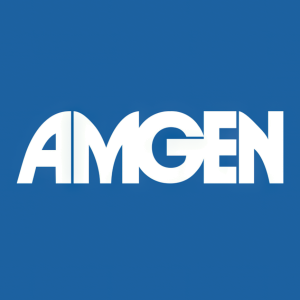AMGEN'S PHASE 2 MARITIDE DATA TO BE PRESENTED AT THE AMERICAN DIABETES ASSOCIATION 85TH SCIENTIFIC SESSIONS
Rhea-AI Summary
Positive
- MariTide demonstrated robust weight loss without plateau over 52 weeks in Phase 2 trials
- MariTide offers unique monthly or less frequent dosing, potentially improving treatment convenience
- Successful Phase 2 results have informed the design of Phase 3 MARITIME program
- Company expanding research portfolio in high-value cardiometabolic space
Negative
- None.
News Market Reaction
On the day this news was published, AMGN declined 0.14%, reflecting a mild negative market reaction.
Data tracked by StockTitan Argus on the day of publication.
MariTide is the First Monthly or Less Frequently Dosed Peptide-Antibody Conjugate Being Investigated for the Treatment of Obesity and Type 2 Diabetes
New Repatha® Data Provide Insight Into the Benefits of Lipid Lowering Therapy in People With Type 1 Diabetes
Amgen to Host Investor Webcast on MariTide Data on June 23 at 4:30 p.m. CDT
Data for MariTide, an investigational long-acting peptide-antibody conjugate subcutaneously administered monthly or less frequently, will be presented during an expert-led Symposium being held on Monday, June 23 from 1:30 p.m. – 3:00 p.m. CDT. The Symposium will highlight 52-week efficacy, safety and tolerability data from Part 1 of the Phase 2 study, complete data from the primary analysis of the Phase 1 pharmacokinetics low dose initiation (PK-LDI) study, and additional information on the Phase 3 MARITIME Chronic Weight Management studies. Topline results from Part 1 of the Phase 2 study were announced in November 2024.
"We look forward to sharing results from our cardiometabolic research at the upcoming ADA meeting, which include 52-week data from Part 1 of the Phase 2 MariTide study showing robust weight loss without a weight loss plateau in people living with obesity, with and without Type 2 diabetes," said Jay Bradner, M.D., executive vice president of Research and Development at Amgen. "These findings have been pivotal in shaping the design of our Phase 3 MARITIME program, and we're confident these studies will continue to demonstrate the potential of MariTide as a unique and differentiated option for people living with obesity and related conditions."
Amgen will host a webcast call for the investment community in conjunction with the ADA Scientific Sessions on Monday, June 23 at 4:30 p.m. CDT. Jay Bradner, M.D., executive vice president of Research and Development at Amgen, along with other members of Amgen's management team, will discuss the MariTide program. The webcast, as with other selected presentations regarding developments in Amgen's business given by management at certain investor and medical conferences, can be found on Amgen's website, www.amgen.com, under Investors. Information regarding presentation times, webcast availability and webcast links are noted on Amgen's Investor Relations Events Calendar. The webcast will be archived and available for replay for at least 90 days after the event.
At the Scientific Sessions, Amgen will also sponsor the ADA Interactive Obesity Experience. Throughout the meeting, attendees will have the opportunity to contribute to a word cloud project in the Exhibit Hall (Booth #1338) and participate in an immersive video experience in the ADA Member Lounge.
The 85th Scientific Sessions will not be livestreamed. On-Demand will open on Wednesday, June 25, 2025, following the meeting. Key Amgen posters and presentations include:
Obesity
- Symposium: Once-Monthly MariTide for the Treatment of Obesity in People with or without Type 2 Diabetes: A 52-Week Phase 2 Study
Session: Monday, June 23 from 1:30 p.m. - 3:00 p.m. CDT, Location: W375 A
Cardiovascular and Repatha
- Cardiovascular Efficacy of Evolocumab in Persons with Type 1 Diabetes Mellitus: Insights from FOURIER Trial
Abstract #1991, Abstract Session: Sunday, June 22 from 12:30 p.m. - 1:30 p.m. CDT
- Lipid-lowering Therapy Patterns of High-risk Cardiovascular Patients without Prior Myocardial Infarction or Stroke: Vesalius-Real - Results from Patients with High-risk Diabetes in the
U.S.
Abstract #1315, Abstract Session: Saturday, June 21 from 12:30 p.m. - 1:30 p.m. CDT
About Obesity
Obesity is a complex biological disease that increases the risk of many other serious diseases and conditions, including Type 2 diabetes, heart failure, kidney disease, sleep apnea, atherosclerotic cardiovascular disease and metabolic dysfunction-associated steatohepatitis. The worldwide prevalence of obesity more than doubled between 1990 and 2022. In the
Obesity is linked to a marked reduction in quality of life and an array of serious medical complications and conditions. Despite the breadth of the disease, the formal recognition of obesity as a chronic disease by the American Medical Association (2013) and the European Health Commission (2021), and medical guidelines recommending pharmacologic treatment in appropriate individuals, only
About MariTide
MariTide is a bispecific glucagon-like peptide 1 (GLP-1) receptor agonist and glucose-dependent insulinotropic polypeptide receptor (GIPR) antagonist being investigated for the treatment of obesity and Type 2 diabetes mellitus. As a pioneering peptide-antibody conjugate molecule with a long half-life and dual mechanism of action, MariTide may allow for greater durability or reduce the likelihood of weight regain after treatment stops. Amgen used its genetic expertise to identify GIP receptor inhibition as a key factor in reducing body mass, an insight that led to MariTide's development. Pre-clinical studies have demonstrated that simultaneously activating GLP-1 and inhibiting GIP pathways had a stronger effect on weight loss than targeting either GLP-1 or GIP receptors alone.
A primary clinical goal for people living with obesity or overweight is to achieve weight loss, and avoid weight regain thereby improving health. Given the heterogeneity of obesity and the number of people impacted, a variety of approaches will be needed. In addition to MariTide, Amgen is also advancing an obesity pipeline, which includes both oral and injectable approaches, composed of both incretin and non-incretin mechanisms.
Amgen's Cardiovascular Ambition
Cardiovascular disease is a leading public health crisis in
For more information about LDL and to learn how to get a free LDL-C test*, visit WhatIsMyLDL.com.
*Terms and conditions apply. Programs subject to change; quantities may be limited.
About Repatha® (evolocumab)
Repatha is a human monoclonal antibody that inhibits proprotein convertase subtilisin/kexin type 9 (PCSK9). Repatha binds to PCSK9 and inhibits circulating PCSK9 from binding to the low-density lipoprotein (LDL) receptor (LDLR), preventing PCSK9-mediated LDLR degradation and permitting LDLR to recycle back to the liver cell surface. By inhibiting the binding of PCSK9 to LDLR, Repatha increases the number of LDLRs available to clear LDL from the blood, thereby lowering LDL-C levels. Repatha has been studied for 12 years in 50 clinical trials with over 51,000 patients.
Repatha is approved in more than 75 countries, including the U.S., Japan, Canada and in all 28 countries that are members of the European Union. Applications in other countries are pending.
Repatha® (evolocumab) Important
INDICATIONS
Repatha® is indicated:
- In adults with established cardiovascular disease to reduce the risk of myocardial infarction, stroke, and coronary revascularization
- As an adjunct to diet, alone or in combination with other low-density lipoprotein cholesterol (LDL-C)–lowering therapies, in adults with primary hyperlipidemia, including heterozygous familial hypercholesterolemia (HeFH), to reduce LDL–C
- As an adjunct to diet and other LDL-C-lowering therapies in pediatric patients aged 10 years and older with HeFH, to reduce LDL-C
- As an adjunct to other LDL–C-lowering therapies in adults and pediatric patients aged 10 years and older with homozygous familial hypercholesterolemia (HoFH), to reduce LDL–C
The safety and effectiveness of Repatha® have not been established in pediatric patients with HeFH or HoFH who are younger than 10 years old or in pediatric patients with other types of hyperlipidemia.
IMPORTANT SAFETY INFORMATION
- Contraindication: Repatha® is contraindicated in patients with a history of a serious hypersensitivity reaction to evolocumab or any of the excipients in Repatha®. Serious hypersensitivity reactions including angioedema have occurred in patients treated with Repatha®.
- Hypersensitivity Reactions: Hypersensitivity reactions, including angioedema, have been reported in patients treated with Repatha®. If signs or symptoms of serious hypersensitivity reactions occur, discontinue treatment with Repatha®, treat according to the standard of care, and monitor until signs and symptoms resolve.
- Adverse Reactions in Adults with Primary Hyperlipidemia: The most common adverse reactions (>
5% of patients treated with Repatha® and more frequently than placebo) were: nasopharyngitis, upper respiratory tract infection, influenza, back pain, and injection site reactions.
From a pool of the 52-week trial and seven 12-week trials: Local injection site reactions occurred in
- Adverse Reactions in the Cardiovascular Outcomes Trial: The most common adverse reactions (>
5% of patients treated with Repatha® and more frequently than placebo) were: diabetes mellitus (8.8% Repatha®,8.2% placebo), nasopharyngitis (7.8% Repatha®,7.4% placebo), and upper respiratory tract infection (5.1% Repatha®,4.8% placebo).
Among the 16,676 patients without diabetes mellitus at baseline, the incidence of new-onset diabetes mellitus during the trial was
- Adverse Reactions in Pediatric Patients with HeFH: The most common adverse reactions (>
5% of patients treated with Repatha® and more frequently than placebo) were: nasopharyngitis, headache, oropharyngeal pain, influenza, and upper respiratory tract infection. - Adverse Reactions in Adults and Pediatric Patients with HoFH: In a 12-week study in 49 patients, the adverse reactions that occurred in at least two patients treated with Repatha® and more frequently than placebo were: upper respiratory tract infection, influenza, gastroenteritis, and nasopharyngitis. In an open-label extension study in 106 patients, including 14 pediatric patients, no new adverse reactions were observed.
- Immunogenicity: Repatha® is a human monoclonal antibody. As with all therapeutic proteins, there is potential for immunogenicity with Repatha®.
Please contact Amgen Medinfo at 800-77-AMGEN (800-772-6436) or 844-REPATHA (844-737-2842) regarding Repatha® availability or find more information, including full Prescribing Information, at www.amgen.com and www.Repatha.com.
About Amgen
Amgen discovers, develops, manufactures and delivers innovative medicines to help millions of patients in their fight against some of the world's toughest diseases. More than 40 years ago, Amgen helped to establish the biotechnology industry and remains on the cutting-edge of innovation, using technology and human genetic data to push beyond what's known today. Amgen is advancing a broad and deep pipeline that builds on its existing portfolio of medicines to treat cancer, heart disease, osteoporosis, inflammatory diseases and rare diseases.
In 2024, Amgen was named one of the "World's Most Innovative Companies" by Fast Company and one of "America's Best Large Employers" by Forbes, among other external recognitions. Amgen is one of the 30 companies that comprise the Dow Jones Industrial Average®, and it is also part of the Nasdaq-100 Index®, which includes the largest and most innovative non-financial companies listed on the Nasdaq Stock Market based on market capitalization.
For more information, visit Amgen.com and follow Amgen on X, LinkedIn, Instagram, YouTube and Threads.
Amgen Forward-Looking Statements
This news release contains forward-looking statements that are based on the current expectations and beliefs of Amgen. All statements, other than statements of historical fact, are statements that could be deemed forward-looking statements, including any statements on the outcome, benefits and synergies of collaborations, or potential collaborations, with any other company (including BeOne Medicines Ltd. or Kyowa Kirin Co., Ltd.), the performance of Otezla® (apremilast), our acquisitions of ChemoCentryx, Inc. or Horizon Therapeutics plc (including the prospective performance and outlook of Horizon's business, performance and opportunities, and any potential strategic benefits, synergies or opportunities expected as a result of such acquisition), as well as estimates of revenues, operating margins, capital expenditures, cash, other financial metrics, expected legal, arbitration, political, regulatory or clinical results or practices, customer and prescriber patterns or practices, reimbursement activities and outcomes, effects of pandemics or other widespread health problems on our business, outcomes, progress, and other such estimates and results. Forward-looking statements involve significant risks and uncertainties, including those discussed below and more fully described in the Securities and Exchange Commission reports filed by Amgen, including our most recent annual report on Form 10-K and any subsequent periodic reports on Form 10-Q and current reports on Form 8-K. Unless otherwise noted, Amgen is providing this information as of the date of this news release and does not undertake any obligation to update any forward-looking statements contained in this document as a result of new information, future events or otherwise.
No forward-looking statement can be guaranteed and actual results may differ materially from those we project. Discovery or identification of new product candidates or development of new indications for existing products cannot be guaranteed and movement from concept to product is uncertain; consequently, there can be no guarantee that any particular product candidate or development of a new indication for an existing product will be successful and become a commercial product. Further, preclinical results do not guarantee safe and effective performance of product candidates in humans. The complexity of the human body cannot be perfectly, or sometimes, even adequately modeled by computer or cell culture systems or animal models. The length of time that it takes for us to complete clinical trials and obtain regulatory approval for product marketing has in the past varied and we expect similar variability in the future. Even when clinical trials are successful, regulatory authorities may question the sufficiency for approval of the trial endpoints we have selected. We develop product candidates internally and through licensing collaborations, partnerships and joint ventures. Product candidates that are derived from relationships may be subject to disputes between the parties or may prove to be not as effective or as safe as we may have believed at the time of entering into such relationship. Also, we or others could identify safety, side effects or manufacturing problems with our products, including our devices, after they are on the market.
Our results may be affected by our ability to successfully market both new and existing products domestically and internationally, clinical and regulatory developments involving current and future products, sales growth of recently launched products, competition from other products including biosimilars, difficulties or delays in manufacturing our products and global economic conditions, including those resulting from geopolitical relations and government actions. In addition, sales of our products are affected by pricing pressure, political and public scrutiny and reimbursement policies imposed by third-party payers, including governments, private insurance plans and managed care providers and may be affected by regulatory, clinical and guideline developments and domestic and international trends toward managed care and healthcare cost containment. Furthermore, our research, testing, pricing, marketing and other operations are subject to extensive regulation by domestic and foreign government regulatory authorities. Our business may be impacted by government investigations, litigation and product liability claims. In addition, our business may be impacted by the adoption of new tax legislation or exposure to additional tax liabilities. Further, while we routinely obtain patents for our products and technology, the protection offered by our patents and patent applications may be challenged, invalidated or circumvented by our competitors, or we may fail to prevail in present and future intellectual property litigation. We perform a substantial amount of our commercial manufacturing activities at a few key facilities, including in
The scientific information discussed in this news release related to our product candidates is preliminary and investigative. Such product candidates are not approved by the
CONTACT: Amgen,
Elissa Snook, 609-251-1407 (media)
Justin Claeys, 805-313-9775 (investors)
![]() View original content to download multimedia:https://www.prnewswire.com/news-releases/amgens-phase-2-maritide-data-to-be-presented-at-the-american-diabetes-association-85th-scientific-sessions-302485214.html
View original content to download multimedia:https://www.prnewswire.com/news-releases/amgens-phase-2-maritide-data-to-be-presented-at-the-american-diabetes-association-85th-scientific-sessions-302485214.html
SOURCE Amgen








